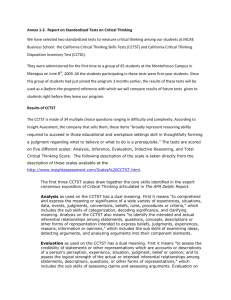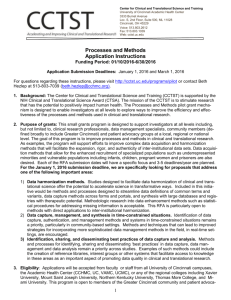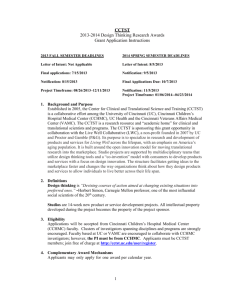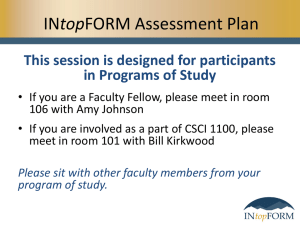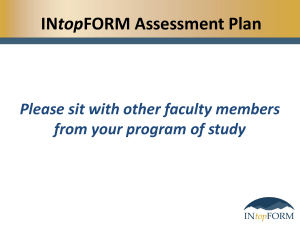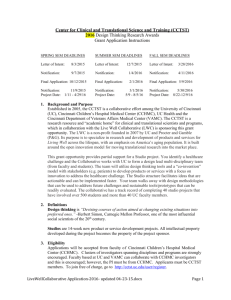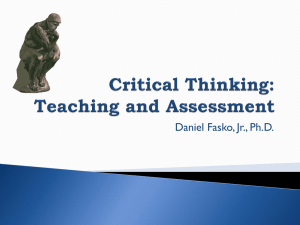I A N
advertisement
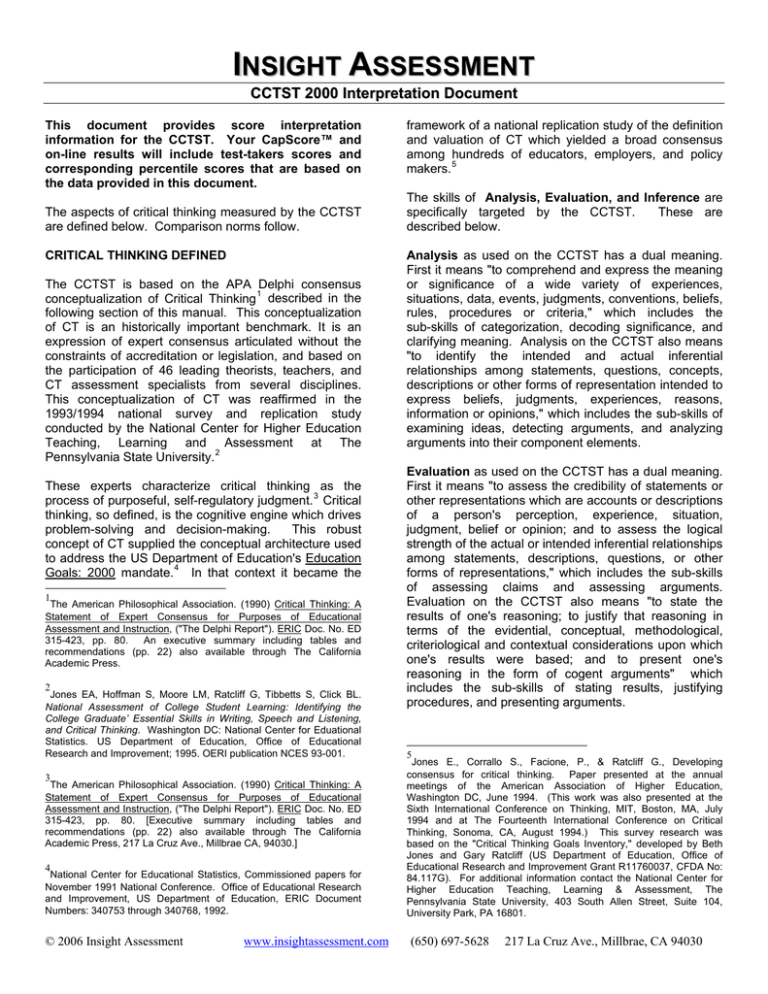
INSIGHT ASSESSMENT CCTST 2000 Interpretation Document This document provides score interpretation information for the CCTST. Your CapScore™ and on-line results will include test-takers scores and corresponding percentile scores that are based on the data provided in this document. The aspects of critical thinking measured by the CCTST are defined below. Comparison norms follow. CRITICAL THINKING DEFINED The CCTST is based on the APA Delphi consensus 1 conceptualization of Critical Thinking described in the following section of this manual. This conceptualization of CT is an historically important benchmark. It is an expression of expert consensus articulated without the constraints of accreditation or legislation, and based on the participation of 46 leading theorists, teachers, and CT assessment specialists from several disciplines. This conceptualization of CT was reaffirmed in the 1993/1994 national survey and replication study conducted by the National Center for Higher Education Teaching, Learning and Assessment at The 2 Pennsylvania State University. These experts characterize critical thinking as the process of purposeful, self-regulatory judgment. 3 Critical thinking, so defined, is the cognitive engine which drives problem-solving and decision-making. This robust concept of CT supplied the conceptual architecture used to address the US Department of Education's Education Goals: 2000 mandate. 4 In that context it became the 1 The American Philosophical Association. (1990) Critical Thinking: A Statement of Expert Consensus for Purposes of Educational Assessment and Instruction, ("The Delphi Report"). ERIC Doc. No. ED 315-423, pp. 80. An executive summary including tables and recommendations (pp. 22) also available through The California Academic Press. 2 Jones EA, Hoffman S, Moore LM, Ratcliff G, Tibbetts S, Click BL. National Assessment of College Student Learning: Identifying the College Graduate’ Essential Skills in Writing, Speech and Listening, and Critical Thinking. Washington DC: National Center for Eduational Statistics. US Department of Education, Office of Educational Research and Improvement; 1995. OERI publication NCES 93-001. 3 The American Philosophical Association. (1990) Critical Thinking: A Statement of Expert Consensus for Purposes of Educational Assessment and Instruction, ("The Delphi Report"). ERIC Doc. No. ED 315-423, pp. 80. [Executive summary including tables and recommendations (pp. 22) also available through The California Academic Press, 217 La Cruz Ave., Millbrae CA, 94030.] 4 National Center for Educational Statistics, Commissioned papers for November 1991 National Conference. Office of Educational Research and Improvement, US Department of Education, ERIC Document Numbers: 340753 through 340768, 1992. © 2006 Insight Assessment www.insightassessment.com framework of a national replication study of the definition and valuation of CT which yielded a broad consensus among hundreds of educators, employers, and policy makers. 5 The skills of Analysis, Evaluation, and Inference are specifically targeted by the CCTST. These are described below. Analysis as used on the CCTST has a dual meaning. First it means "to comprehend and express the meaning or significance of a wide variety of experiences, situations, data, events, judgments, conventions, beliefs, rules, procedures or criteria," which includes the sub-skills of categorization, decoding significance, and clarifying meaning. Analysis on the CCTST also means "to identify the intended and actual inferential relationships among statements, questions, concepts, descriptions or other forms of representation intended to express beliefs, judgments, experiences, reasons, information or opinions," which includes the sub-skills of examining ideas, detecting arguments, and analyzing arguments into their component elements. Evaluation as used on the CCTST has a dual meaning. First it means "to assess the credibility of statements or other representations which are accounts or descriptions of a person's perception, experience, situation, judgment, belief or opinion; and to assess the logical strength of the actual or intended inferential relationships among statements, descriptions, questions, or other forms of representations," which includes the sub-skills of assessing claims and assessing arguments. Evaluation on the CCTST also means "to state the results of one's reasoning; to justify that reasoning in terms of the evidential, conceptual, methodological, criteriological and contextual considerations upon which one's results were based; and to present one's reasoning in the form of cogent arguments" which includes the sub-skills of stating results, justifying procedures, and presenting arguments. 5 Jones E., Corrallo S., Facione, P., & Ratcliff G., Developing consensus for critical thinking. Paper presented at the annual meetings of the American Association of Higher Education, Washington DC, June 1994. (This work was also presented at the Sixth International Conference on Thinking, MIT, Boston, MA, July 1994 and at The Fourteenth International Conference on Critical Thinking, Sonoma, CA, August 1994.) This survey research was based on the "Critical Thinking Goals Inventory," developed by Beth Jones and Gary Ratcliff (US Department of Education, Office of Educational Research and Improvement Grant R11760037, CFDA No: 84.117G). For additional information contact the National Center for Higher Education Teaching, Learning & Assessment, The Pennsylvania State University, 403 South Allen Street, Suite 104, University Park, PA 16801. (650) 697-5628 217 La Cruz Ave., Millbrae, CA 94030 INSIGHT ASSESSMENT CCTST 2000 Interpretation Document Inference as used on the CCTST means "to identify and secure elements needed to draw reasonable conclusions; to form conjectures and hypotheses, to consider relevant information and to educe the consequences flowing from data, statements, principles, evidence, judgments, beliefs, opinions, concepts, descriptions, questions, or other forms of representation," which includes the sub-skills of querying evidence, conjecturing alternatives, and drawing conclusions. The following traditional scores are also provided Deductive Reasoning as used in the CCTST sub-scale means the assumed truth of the premises purportedly necessitates the truth of conclusion. Inductive Reasoning as used in the CCTST sub-scale means an argument's conclusion is purportedly warranted, but not necessitated, by the assumed truth of its premises. Scientific confirmation and experimental disconfirmation are examples of inductive reasoning. The Inductive and deductive scales overlap with the analysis, inference, and evaluation scales. analysis, inference, and evaluation add up to the CCTST total score. Induction and deduction also add up to the CCTST total score. © 2006 Insight Assessment www.insightassessment.com (650) 697-5628 217 La Cruz Ave., Millbrae, CA 94030 INSIGHT ASSESSMENT CCTST 2000 Interpretation Document 2 Yr College United States National Norms: CCTST Total Score 0-5 6 7 8 9 10 11 12 13 14 15 16 17 18 19 20 21 22 23 24 25 26 27 28 29 30 31 32 33 34 % Analysis % Inference % Evaluation % 1 2 4 7 12 18 26 34 43 54 61 69 76 82 87 91 94 96 97 98 99 99 99 99 99 99 99 99 99 99 3 4 5 6 25 50 75 99 5 7 8 9 25 50 75 99 2 4 5 6 25 50 75 99 © 2006 Insight Assessment Millbrae, CA 94030 www.insightassessment.com Deductive Reasoning 4 6 8 9 (650) 697-5628 % 25 50 75 99 Inductive Reasoning 7 9 11 12 217 La Cruz Ave., % 25 50 75 99 INSIGHT ASSESSMENT CCTST 2000 Interpretation Document 4 Yr College United States National Norms: CCTST Total Score 0-6 7 8 9 10 11 12 13 14 15 16 17 18 19 20 21 22 23 24 25 26 27 28 29 30 31 32 33 34 % Analysis % Inference % Evaluation % 1 2 3 5 8 12 18 24 31 38 46 54 61 68 74 79 84 88 91 93 95 97 98 99 99 99 99 99 99 3 4 6 7 25 50 75 99 6 8 10 14 25 50 75 99 3 4 6 10 25 50 75 99 © 2006 Insight Assessment Millbrae, CA 94030 www.insightassessment.com Deductive Reasoning 5 7 9 15 (650) 697-5628 % 25 50 75 99 Inductive Reasoning 7 10 12 16 217 La Cruz Ave., % 25 50 75 99 INSIGHT ASSESSMENT CCTST 2000 Interpretation Document Graduate Student United States National Norms: CCTST % 1 2 2 5 8 10 14 18 25 31 36 40 45 50 55 59 64 67 71 77 81 84 87 90 92 95 96 98 99 Total Score 0-6 7 8 9 10 11 12 13 14 15 16 17 18 19 20 21 22 23 24 25 26 27 28 29 30 31 32 33 34 Analysis % Inference % Evaluation % 3 5 6 7 25 50 75 99 6 9 12 16 25 50 75 99 3 6 8 11 25 50 75 99 © 2006 Insight Assessment www.insightassessment.com Deductive Reasoning 5 7 11 17 (650) 697-5628 % 25 50 75 99 Inductive Reasoning 7 10 13 17 % 25 50 75 99 217 La Cruz Ave., Millbrae, CA 94030
